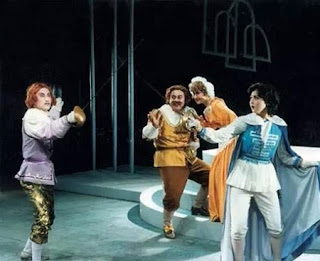Hello everyone once again,
Our project on 21st Century Skills continues non-stop and in the last meeting we have discussed teaching and learning materials, textbooks and the notion of EIL (English as an International Language) which again brings us to the similar topics that we have previously discussed such as World Englishes, English as a Lingua Franca and English being a global language. We have seen that all these terminology is interrelated and they promote adding a variety to our language classrooms, different accents and dialects of English spoken around the world and also not to underestimate the place of 'cultures' in teaching. Having discussed a lot about English as a global language, we, as each group, were eventually asked to create an activity that will promote GELT (Global Englishes for Language Teaching). We have used a famous play by William Shakespeare "Twelfth Night" and built our activity around this play and tried to show our learners that different adaptations are possible, there is no only one style to act out this play and put on stage, rather there might be multiple interpretations due to different cultures and language uses.
Here you can take a look at our activity:
Think Local, Write in English: “Turkish Twelfth Night “
Goal
This activity aims to raise awareness on the issue of cultural relativity that different styles and interpretations are possible for the same play through showing different pictures of the adaptations (see Appendix) of Twelfth Night by William Shakespeare.
Appropriate Courses: Literature & Language Teaching, Drama, Identity and Culture.
Class Time: 3 class hours (120 minutes)
Procedure
(It is assumed that everyone in the classroom have watched the original version of the play on YouTube (National Theatre) beforehand by the suggestion of the teacher.)
(1) Warm up and interaction to World Englishes literature (10-15 minutes). Teacher shows pictures of Shakespeare, The Globe Theatre, and Elizabethan costumes, etc. And T asks the following questions: Did you like the play you watched by Shakespeare? What was the thing that you attracted/disliked most? Which century/culture/setting do these costumes belong to? Which cultures are represented in the play? After some answers and discussions teacher sets a groupwork.
(2) Group Work (20-25 minutes). In order for students to better make sense of the plot, Teacher handouts different set of scenes from Twelfth Night which are not in the right order. Students are expected to put them into right order in groups.
(3) Group Work (25 minutes) Teacher writes the names of different cultures on small papers and make students randomly pick the papers (Hindi, Chinese, Afro American, Japanese Anime & Pantomime version and Russian). Then, Students will decide on the cultural elements based on their world knowledge (Constructivism). Teacher hands out worksheets consisting categories such as language use, setting (dominant colors, gender representation, censorship), costumes, cultural elements, atmosphere. Then, Teacher shows the pictures of different adaptations of Twelfth Night around the world. And each group will put a tick on the features that they have found in their groups. Then, a speaker from each group will share the answers with the class. Teacher writes the answers on the board. Students will comment on one another’s work.
Whole Class Discussion (30 minutes) Now that they have identify other cultures, teacher will ask them to consider the Turkish context, asking the following questions: What kind of costumes they would wear? What might be the settings? This will initiate a deconstructive approach on literary works based on multiculturalism and critical thinking.
The pictures will be used in this activity,
Hindi adaptation of Twelfth Night "Piya Behrupiya", even Shakespeare's famous portrait is adapted to Indian culture.
Again, the same adaptation
This might as well give a gist to your learners on how might this adaptation put on stage.
Japanese Pantomime version
Modern musicalized version in US
Anime version, Japanese
Chinese Adaptation
Again Chinese adaptation but modernized version and might reflect Chinese culture more (scene, setting, color and decoration are suggestive)
All-men adaptation in Russian style
Our intention as a group is to draw on our language learners' world knowledge. Therefore, we try to make them guess about how Twelfth Night can be played in different cultures, how language use might they include especially after watching the original version of the play. Is it a must to stick to the original version when making adaptation, should we use Shakespearean language and/or purely Received Pronunciation? Although some of them might be biased about some cultures, we try to make them guess and then realize how different adaptations for different cultures are possible.
As prospective language teachers, we really would like to here your comments and criticisms about our activity. We also desire language teachers to use this activity in their classrooms and maybe adapting it to their own contexts, if there is a need for it. Looking forward to read your comments!









